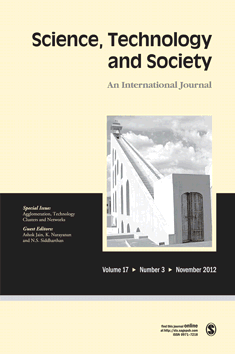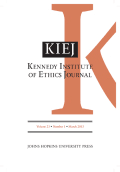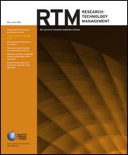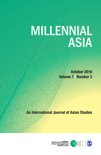
Science Technology and Society
Scope & Guideline
Fostering Critical Perspectives on Technology's Role
Introduction
Aims and Scopes
- Interdisciplinary Research on Technology and Society:
The journal encourages research that combines insights from various disciplines, including sociology, economics, political science, and environmental studies, to explore the multifaceted relationships between technology and society. - Innovation Ecosystems and Startup Dynamics:
A core area of focus is the analysis of innovation ecosystems, particularly the role of startups in driving technological change and economic development across different regions. - Ethics and Governance of Emerging Technologies:
The journal emphasizes ethical considerations and governance frameworks surrounding emerging technologies, including artificial intelligence, biotechnology, and digital health, ensuring that societal implications are critically examined. - Sustainability and Technological Adaptation:
Research on sustainable practices and the adaptation of technology to address environmental challenges is a key theme, highlighting the role of innovation in promoting ecological balance. - Global Perspectives on Science and Technology:
The journal aims to provide a global perspective on how different cultures and nations approach science and technology, particularly in the context of globalization and colonial histories.
Trending and Emerging
- Artificial Intelligence and Ethical Implications:
Recent publications highlight the growing concern over ethical issues surrounding AI, emphasizing the need for frameworks that address the societal impacts of automated technologies. - Sustainable Innovation Practices:
There is a notable increase in research concerning sustainable manufacturing and eco-innovation, underscoring the importance of integrating environmental considerations into technological development. - Health Technology and Pandemic Responses:
The COVID-19 pandemic has spurred a surge in research focused on digital healthcare innovations and responses to health crises, showcasing the critical role of technology in public health. - Regional Innovation Ecosystems:
Emerging themes include the study of regional innovation ecosystems, particularly in developing countries, which explore how local contexts shape technological advancements and entrepreneurship. - Decolonization of Science and Technology Studies:
A growing body of work is emerging that critiques traditional narratives in science and technology studies, advocating for a decolonized approach that respects and integrates diverse epistemologies.
Declining or Waning
- Traditional Industrial Innovation Models:
Research focusing solely on traditional models of industrial innovation, particularly in established economies, is becoming less frequent as the focus shifts toward more dynamic and diverse innovation ecosystems. - Static Approaches to Technology Transfer:
Themes related to static or linear models of technology transfer are declining in favor of more nuanced approaches that consider the complexities of knowledge dynamics and collaborative innovations. - Narrowly Defined Case Studies:
The trend of publishing narrowly defined case studies that do not engage with broader theoretical frameworks or interdisciplinary perspectives is decreasing, as the journal seeks to enrich its content with more holistic analyses.
Similar Journals

International Journal of Innovation and Sustainable Development
Uniting Research for a Greener TomorrowThe International Journal of Innovation and Sustainable Development, published by INDERSCIENCE ENTERPRISES LTD, is a pivotal platform for researchers, professionals, and students interested in areas such as management of technology and innovation, as well as renewable energy and sustainability. Since its inception in 2005, this journal has aimed to disseminate high-quality research that addresses the urgent challenges of innovation in the context of sustainability. Located in the United Kingdom with an outreach extending to a global audience, the journal features a diverse range of articles aimed at fostering interdisciplinary collaboration. With an increasing importance in today’s rapidly evolving societal and environmental landscape, this journal provides essential insights and advancements in its fields of study, which are crucial for informed decision-making and policy formulation. Although currently placed in the lower quartiles of its categories, the journal still plays an essential role in nurturing new ideas and facilitating discussions that can lead to impactful advancements in innovation and sustainability.

Journal of Posthuman Studies-Philosophy Technology Media
Reimagining Human Experience in a Digital WorldJournal of Posthuman Studies - Philosophy Technology Media, published by Penn State University Press, serves as a critical forum for interdisciplinary explorations at the intersection of philosophy, technology, and media. With ISSN 2472-4513 and E-ISSN 2471-4461, this journal aims to examine the implications of posthumanist thought through the lens of contemporary societal and cultural dynamics. Since its inception in 2019, it has established itself within prominent academic categories, ranking Q3 in both Arts and Humanities (miscellaneous) and Cultural Studies, and showcasing a commitment to fostering discussions in gender studies and sociology. Though currently lacking an Open Access format, its rigorous peer-reviewed articles contribute significantly to ongoing discourse, making it an essential resource for researchers, professionals, and students engaged in related fields. With a steady focus on the evolving landscape of human experience in a technologically infused era, the journal invites contributions that challenge traditional paradigms and encourage innovative thinking.

Journal of Tourism History
Bridging the Gap Between Yesterday's Journeys and Today's ExperiencesJournal of Tourism History is a premier academic journal published by Routledge Journals, Taylor & Francis Ltd, dedicated to advancing the field of tourism studies through a historical lens. Since its inception in 2009, the journal has provided a vital platform for researchers, professionals, and students to explore the intricate relationships between history and tourism. With an impressive range of quartile rankings across several categories, including Q2 in History and Q3 in Cultural Studies, it ranks significantly within the Scopus database, attesting to its scholarly impact. Although the journal does not currently provide open access options, it remains a critical resource for exploring historical perspectives in tourism, leisure, and hospitality management. The journal's aim is to foster dialogue and inspire future research that connects our past with present and future tourism practices, making it an essential read for those passionate about the historical dimensions of leisure and travel.

Societies is an esteemed academic journal dedicated to the exploration and analysis of social phenomena, published by MDPI in Switzerland. Established in 2011, this Open Access journal provides a platform for rigorous research and critical discussions in the field of social sciences, offering a valuable resource for scholars, professionals, and students alike. With a commendable impact factor reflected by its Q2 ranking in the miscellaneous social sciences category, it has solidified its position among the elite journals in its field, ranking 78th out of 275 in Scopus, placing it within the 71st percentile. The journal's commitment to making research freely accessible contributes to the ongoing discourse in social sciences and enhances the visibility of innovative ideas and findings. Researchers are encouraged to engage with current studies and submit their contributions to enrich this dynamic field, as Societies continues to shape the future of social science research.

Internet Policy Review
Transforming Perspectives on Internet and Society.Internet Policy Review, published by the ALEXANDER VON HUMBOLDT INSTITUTE FOR INTERNET AND SOCIETY, is a leading open-access journal dedicated to exploring the complex interplay between internet policy, technology, and society. Since its inception in 2012, this journal has established itself as a pivotal resource for researchers and practitioners, achieving a remarkable status of Q1 in key categories such as Communication, Computer Networks and Communications, and Management, Monitoring, Policy, and Law as of 2023. With an impressive Scopus ranking substantiating its impact—44th in Communication and 87th in Environmental Science—this journal serves as an essential platform for cutting-edge research and critical discussions surrounding internet governance and digital policy. By providing unrestricted access to its articles, the Internet Policy Review supports a vibrant academic community, fostering innovation and collaboration in the ever-evolving landscape of digital communication. Based in Berlin, Germany, the journal invites contributions that advance understanding and reshape perspectives on contemporary internet issues, making it a must-read for students, researchers, and professionals dedicated to shaping the future of internet policy.

NanoEthics
Innovating Thought Leadership in Nanotechnology EthicsNanoEthics is a pioneering journal published by Springer, dedicated to exploring the complex intersections of nanotechnology and ethical considerations. With an ISSN of 1871-4757 and an E-ISSN of 1871-4765, this influential journal has steadily progressed since its inception in 2007, sustaining high academic standards and relevance through 2024. It is notably positioned in the Q1 category for History and Philosophy of Science and Philosophy, reflecting its significant impact in these disciplines, and holds commendable rankings in several other categories, including Social Sciences and Management of Technology and Innovation. With its commitment to fostering rigorous dialogues and interdisciplinary research, NanoEthics serves as an essential platform for researchers, professionals, and students engaged in understanding the socio-ethical dimensions of nanoscience. The journal's comprehensive scope invites contributions that challenge conventional paradigms, encouraging innovative thought leadership in the realms of technology and ethics.

KENNEDY INSTITUTE OF ETHICS JOURNAL
Navigating the Complexities of Ethics in Health and SocietyThe KENNEDY INSTITUTE OF ETHICS JOURNAL, published by the prestigious Johns Hopkins University Press, stands as a leading periodical in the realm of ethics, particularly emphasizing the intersection of health policy, social sciences, history, and philosophy of science. With an ISSN of 1054-6863 and an E-ISSN of 1086-3249, this journal has been a cornerstone of ethical discourse since its inception in 1991. Renowned for its rigorous peer-review process, the journal boasts impressive rankings, including Q1 in History and Philosophy of Science and Q2 in Health (Social Science) for 2023. Researchers, professionals, and students alike will find this journal invaluable for navigating complex ethical issues, providing a platform for innovative research and discourse. Although currently not offering Open Access, its contributions to the fields of ethics and legal aspects of health are profound, making it an essential resource for those engaged in these critical discussions.

RESEARCH-TECHNOLOGY MANAGEMENT
Fostering collaboration in the realm of technology and innovation.RESEARCH-TECHNOLOGY MANAGEMENT, an esteemed journal published by Taylor & Francis Inc, serves as a pivotal platform for disseminating cutting-edge research in the fields of engineering, technology management, innovation strategy, and management science. With a rich history spanning from 1988 to the present, this journal has achieved an impressive ranking, placing it in the Q2 category across multiple areas including Engineering, Management of Technology and Innovation, and Strategy and Management, making it a respected resource for scholars and practitioners alike. Although primarily subscription-based, the journal maintains strict academic rigor, ensuring that each publication contributes significantly to the ongoing discourse within the dynamic landscape of technology management. Researchers, professionals, and students can rely on RESEARCH-TECHNOLOGY MANAGEMENT to furnish valuable insights and evidence-based strategies essential for navigating the complexities of innovation and technology integration in today’s fast-paced environment.

Millennial Asia
Bridging Regional Expertise with Global PerspectivesMillennial Asia is a premier academic journal published by SAGE Publications Inc that serves as a vital platform for interdisciplinary research in the vibrant fields of cultural studies, development, economics, political science, and sociology. With its ISSN 0976-3996 and E-ISSN 2321-7081, the journal provides a comprehensive examination of the socio-economic and political landscapes of Asia, fostering dialogue between regional experts and global scholars. Since its inception in 2014, it has established itself as a significant voice in the academic community, achieving a remarkable quartile ranking of Q1 in Cultural Studies and multiple Q2 rankings in Development, Economics, and Political Science disciplines for 2023. The journal's Scopus rankings further underscore its impact, with notable percentiles in various categories, indicating its commitment to high-quality research. Despite being a non-open access journal, it provides targeted insights and critical analyses that are indispensable for researchers, professionals, and students interested in understanding the complexities of contemporary Asian societies. As it converges towards 2024, Millennial Asia continues to expand its reach and relevance in the rapidly evolving academic landscape.

Journal of Contemporary China
Shaping Discourse on China's FutureJournal of Contemporary China, published by Routledge Journals, Taylor & Francis Ltd, is a prestigious peer-reviewed journal that addresses critical issues concerning contemporary Chinese society, politics, and its role in global dynamics. With an ISSN of 1067-0564 and an E-ISSN of 1469-9400, it stands as a leading platform for scholarly research since its inception in 1992. Recognized for its high impact, the journal ranks in the Q1 category across multiple disciplines including Development and Political Science, showcasing its relevance and influence in shaping discourse around China. As of 2023, it occupies notable positions in Scopus rankings within Social Sciences, placing it in the 91st percentile for Political Science and International Relations. The journal offers an essential resource for researchers, professionals, and students interested in uncovering the complexities of China's evolving landscape, making it a vital reference for academic study and policy formulation.